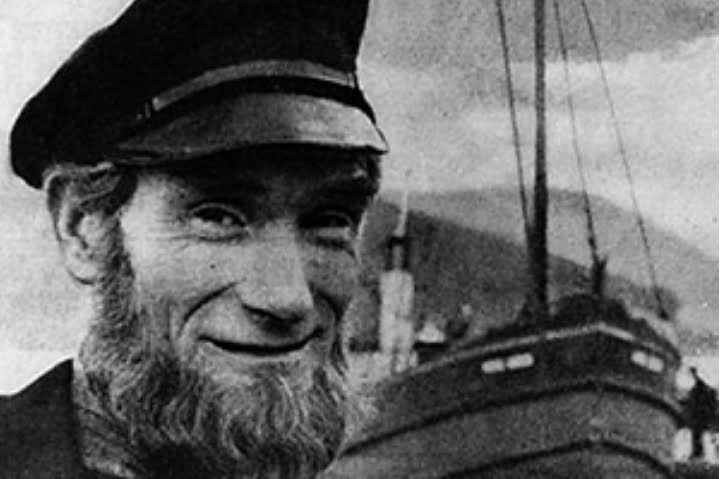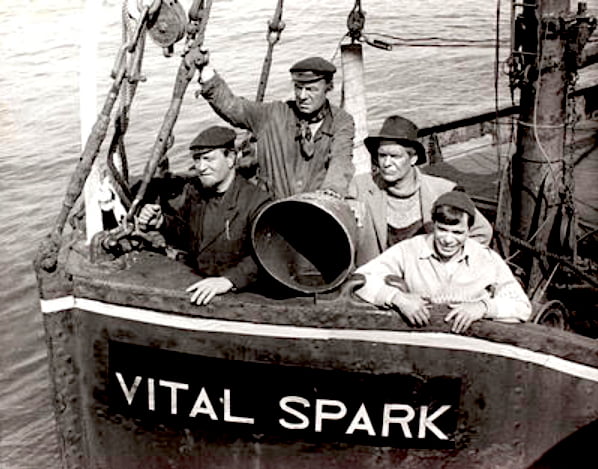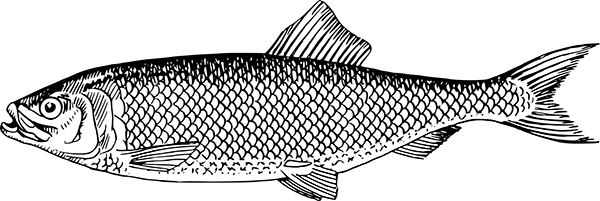Including the full text of Neil Munro’s Para Handy story, The Herring – A Gossip
PARA HANDY
The Herring – A Gossip appears in the collection of Para Handy stories, In Highland Harbours with Para Handy (1911). Captain of the Vital Spark, a Clyde Puffer (small cargo boat) working between Glasgow and the ports of Scotland’s West Coast, Para Handy was the great comic creation of Neil Munro (1863 – 1930).
As the title suggests, The Herring – A Gossip is a fictional conversation rather than a story. It speaks to the glory days of the Loch Fyne herring fishery and obliquely to the struggle between ring-netting, which began in the 1830s at Tarbert, and the older drift-netting tradition, which held on in the upper reaches of the loch.
Ring-netting was prohibited for a number of years, but was legalised in 1867. It may have contributed to the herring scarcity in Loch Fyne discussed by the crew of the Vital Spark, but, as Para Handy argues, the herring is, chust a mystery.
Munro wrote the Para Handy tales under the pen name Hugh Foulis and they appeared in the Glasgow Evening News between 1905 and 1923 and in various collections. In them, Para Handy (from the Gaelic Para Shandaigh or Peter – Paraig – son of Sandy) is joined in his adventures by Dougie the Mate, engineer Dan Macphail and deckhand, The Tar, who is replaced by his cousin Sunny Jim.

There have been three BBC television versions of the stories. The first, Para Handy – Master Mariner, with Duncan Macrae in the role, saw 6 episodes broadcast in 1959 and 1960. In that series Roddy McMillan played Dougie, In the second version, The Vital Spark, he took on the role of Para Handy, while John Grieve reprised his role as Macphail. There were 14 episodes between 1965 and 1967, 7 of which were remade in colour and broadcast in 1973/74). The third version, The Tales of Para Handy, with Gregor Fisher, had 9 episodes, broadcast in 1994/95.

THE HERRING – A GOSSIP
by Neil Munro
“Of aal the fish there iss in the sea,” said Para Handy, “nothing bates the herrin’; it’s a providence they’re plentiful and them so cheap!”
“They’re no’ in Loch Fyne, wherever they are,” said Dougie sadly; “the only herrin’ that they’re gettin’ there iss rud ones comin’ up in barrels wi’ the Cygnet or the Minard Castle. For five years back the trade wass desperate.”
“I wouldna say but you’re right,” agreeably remarked the Captain. “The herrin’ iss a great, great mystery. The more you will be catchin’ of them the more there iss; and when they’re no in’t at aal they’re no’ there” – a great philosophical truth which the crew smoked over in silence for a few minutes.
“When I wass a hand on the gabberts,” continued the Captain, “the herrin’ fishin’ of Loch Fyne wass in its prime. You ken yoursel’ what I mean; if you don’t believe me, Jum, there’s Dougie himsel’ ’ll tell you. Fortunes! chust simply fortunes! You couldna show your face in Tarbert then but a lot of the laads would gaither round at wance and make a jovial day of it. Wi’ a barrel of nets in a skiff and a handy wife at the guttin’, a man of the least agility could make enough in a month to build a land o’ hooses, and the rale Loch Fyne was terrible namely over aal the world.”
“I mind o’t mysel’,” said Sunny Jim, “they never sold onything else but the rale Loch Fyne in Gleska.”
“They did that whether or no’,” explained Para Handy, “for it wass the herrin’s of Loch Fyne that had the reputation.”
“I’ve seen the Rooshians eatin’ them raw in the Baltic,” said Macphail, the engineer, and Dougie shuddered. “Eating them raw!” said he; “the dirty duvvles!”
“The herrin’ wass that thick in Loch Fyne in them days,” recalled the Captain, “that you sometimes couldna get your anchor to the ground, and the quality was chust sublime. It wassna a tred at aal so much as an amusement; you went oot at night when the weans wass in their beds, and you had a couple o’ cran on the road to Clyde in time for Gleska’s breakfast. The quays wass covered wi’ John O’Brian’s boxes, and man alive! but the wine and spirit tred wass busy. Loch Fyne wass the place for Life in them days – high jeeks and big hauls; you werena very smert if you werena into both o’ them. If you don’t believe me, Dougie himsel’ ’ll tell you.”
“You have it exact, Peter,” guaranteed the mate, who was thus appealed to; “I wass there mysel’.”
“Of course I have it exact,” said Para Handy; “I assure you it’s no’ a thing I read in the papers. To-day there’s no’ a herrin’ in Loch Fyne or I’m mistaken.”
“If there’s wan he’ll be kind o’ lonely,” said the mate. “I wonder what in the muschief’s wrong wi’ them?”
“You might shot miles o’ net for a month and there’s no’ a herrin’ will come near them.”
“Man! aren’t they the tumid, frightened idiots!” said Dougie, with disgust.
“If ye ask me, I think whit spoiled the herrin’ fishing in Loch Fyne was the way they gaed on writin’ aboot it in the papers,” said Macphail. “It was enough to scunner ony self respectin’ fish. Wan day a chap would write that it was the trawlers that were daein’ a’ the damage; next day anither chap would say he was a liar, and that trawlin’ was a thing the herrin’ thrived on. Then a chap would write that there should be a close time so as to gie the herrin’ time to draw their breaths for anither breenge into the nets; and anither chap would write from Cambeltoon and say a close time would be takin’ the bread oot o’ the mooths o’ his wife and weans. A scientific man said herrin’ came on cycles –”
“He’s a liar, anyway,” said the Captain, with conviction. “They were in Loch Fyne afore the cycle was invented. Are you sure, Macphail, it’s no’ the cod he means?”
“He said the herrin’ fishin’ aye missed some years noo and then in a’ the herrin’ places in Europe as weel’s in Loch Fyne, and the Gulf Stream had something to dae wi’t.”
“That’s the worst o’ science,” said the Captain piously; “it takes aal the credit away from the Creator. Don’t you pay attention to an unfidel like that; when the herrin’ was in Loch Fyne they stayed there aal the time, and only maybe took a daunder oot noo and then the length o’ Ballantrae.”
“If it’s no the Gulf Stream, then ye’ll maybe tell us whit it is?” said the engineer, with some annoyance.
“I’ll soon do that,” said Para Handy; “if you want to ken, it’s what I said – the herrin’ iss a mystery, chust a mystery!”
“I’m awfu’ gled ye told me,” said the engineer ironically. “I aye wondered. Whit’s parteecular mysteriousness aboot it?”
“It’s a silly fish,” replied the Captain; “it’s fine for eatin’, but it hasna the sagacity. If it had the sagacity it wouldna come lower than Otter Ferry, nor be gallivantin’ roond the Kyles o’ Bute in daylight. It’s them innovations that’s the death o’ herrin’. If the herrin’ stayed in Loch Fyne attendin’ to its business and givin’ the drift-net crews encouragement, it would have a happier life and die respected.
“Whenever the herrin’ of Loch Fyne puts his nose below Kilfinan, his character is gone. First the Tarbert trawlers take him oot to company and turn his heid; then there iss nothing for it but flying trips to the Kyles o’ Bute, the Tail o’ the Bank, and Gareloch. In Loch Fyne we never would touch the herrin’ in the daytime, nor in winter; they need a rest, forbye we’re none the worse o’ one oorsel’s; but the folk beneath Kilfinan have no regard for Chrustian principles, and they no sooner see an eye o’ fish than they’re roond aboot it with trawls, even if it’s the middle o’ the day or New-Year’s mornin’. They never give the fish a chance; they keep it on the run till its fins get hot. If it ventures ass far ass the Tail o’ the Bank, it gets that busy wi’ the sight o’ the shippin’ trade that it loses the way and never comes back to Loch Fyne again. A silly fish! If it only had sagacity! Amn’t I right, Dougie?”
“Whatever you say yoursel’, Captain; there’s wan thing sure, the herrin’s scarce.”
“The long and short of it iss that they’re a mystery,” concluded Para Handy.
See also
- BALTIC HERRING
- BRITISH FISHERY
- CALLER HERRIN’ (FILM)
- CALLER HERRIN’ (SONG)
- DIVINE PROVIDENCE
- DRIFT OR GILL NETTING
- DRIFTERS (DOCUMENTARY FILM)
- EYVIND SKÁLDASPILLIR
- HARENG SAUR MONOLOGUES
- HERRING LASSES
- HERRING’S HEAD
- LOCKMAN, JOHN
- MUIR, JIM (HERRING INTERVIEW, ACHILTIBUIE)
- MONKEY BUSINESS
- NASHES LENTEN STUFFE
- NEUCRANTZ: ON HERRING (1654)
- OATMEAL
- OLIVIER, LAURENCE
- PROPHETIC HERRINGS
- RED HERRING JOKE, THE
- RING NET: WILL MACLEAN
- RING NETTING
- SHOALS OF HERRING, THE
- SINGING THE FISHING
- SWIFT, JONATHAN
- ULLAPOOL
- WHEN HERRINGS LIVED ON DRY LAND
- WILLIAMS, WILLIAM CARLOS: FISH
